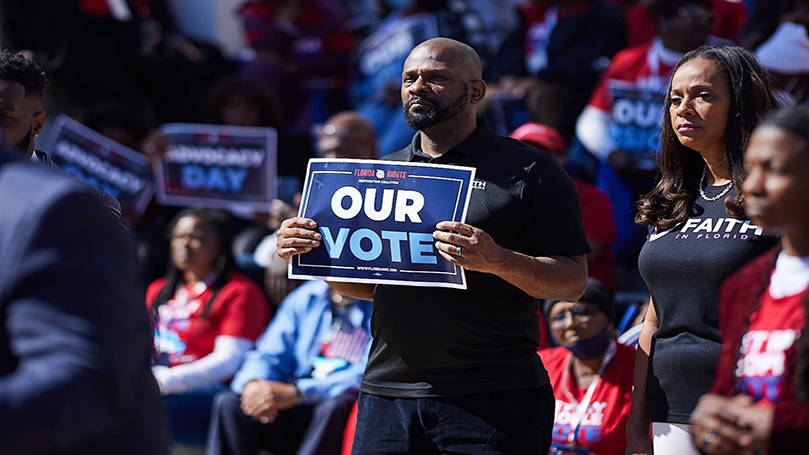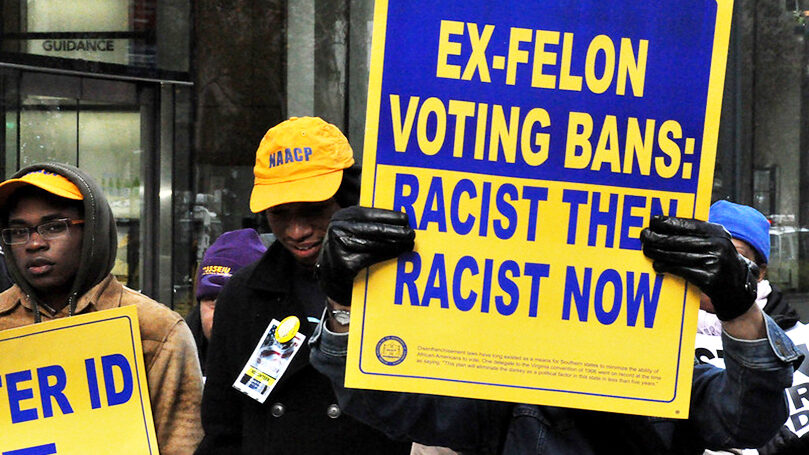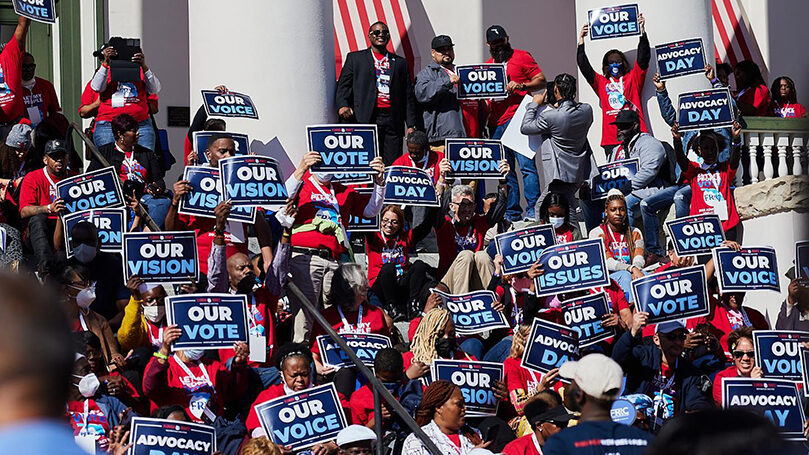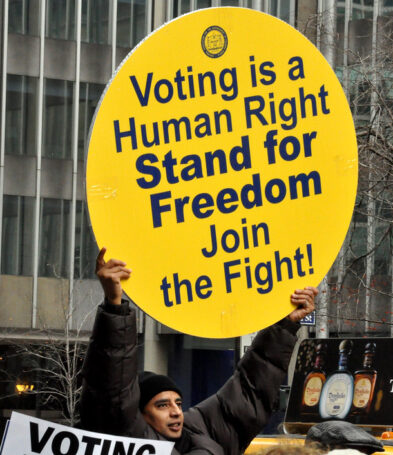
Florida’s Republican Governor, Ron DeSantis, last year signed a bill, SB90, that will make it harder for people in Florida to vote. This is voter suppression. It is not Florida’s Republican leadership’s first rodeo with voter suppression, nor will it be the last.
Florida has been one of four states in the country that conditioned the restoration of voting rights to felons after certain financial obligations are met. The other three are Alabama, Arizona, and Tennessee. Besides the usual condition of payment of court fines and costs, Tennessee also requires felons to be current on child support obligations before the restoration of rights. The same does not apply to non-felons.
It is estimated that nationwide 5.2 million people cannot vote because of this type of disenfranchisement. In Florida it is estimated that over 900,000 felons are unable to vote. This is so despite a constitutional amendment, very recently enacted by referendum, ostensibly restoring voting rights to felons. Only approximately 32,000 felons were able to take advantage of the amendment and vote in 2020.
Florida leads the country in disenfranchisement.
Before this amendment, 23.3% of the Black population in Florida were disenfranchised. Since passage of that constitutional amendment, that number has been reduced to 15%. Among the white population approximately 6% are disenfranchised. Notably, the State of Florida leads the country in disenfranchisement. We are also number one in toll roads, constricting pythons, toxic algae, low wages, and mobile home living, among other honors.
The new legislation, SB90, has some twists. It was specifically enacted to avoid court challenges that struck the last time suppression was tried. Unlike prior legislation, SB90 is not clearly targeted. As one of the legislation’s sponsors described it, it targets lazy voters, and lazy voters are Democratic voters and independents. The portions of the minority population that this legislation does target are not always clear.
The bill is part of a nationwide legislative push by Republican lawmakers to reduce voter turnout in the upcoming elections and appease the Trump wing of the party that tried to steal the election by claiming it was stolen.
Three strikes and out?
In 2018 the Republican legislature in Florida had a go at targeted voter suppression and it didn’t work out well for them. This new legislation, which is now undergoing a challenge in a Federal District Court, is the same legislation that was passed and signed into law in Georgia, Iowa, and Texas.
From the Republican perspective, this new round of voter suppression is timely. The claims are all about voter fraud, which is all about Donald Trump and demographics. In 2018 Florida experienced an influx of new citizens from Puerto Rico, which was then long suffering due to hurricanes. The numbers were in the millions. The hurricane damage has never been sufficiently addressed there.
Despite this inflow of citizens and the clear need, Florida refused to provide ballots in the Spanish language, even though ballots usually contain lengthy referendum sections in English. A Florida district court struck that down, ordering supervisors of elections to include Spanish translations, where appropriate (Rivera v. Barton). Strike one.
Also in 2018, the State of Florida prohibited early voting sites to be located on college campuses. There was no sensible reason for this restriction that the State of Florida could provide, since early voting sites generally make voting more convenient and less onerous, and they tend to limit long lines. That restriction was also struck down as an unconstitutional impediment to voting (League of Women Voters v. Lee). Strike two.

Finally, that same district court, after a hearing, ordered Governor Rick Scott to restore voting rights to convicted felons, who were denied the vote after serving their sentence. He had done this despite an election that had approved a constitutional amendment allowing for the restoration of rights to felons after their sentence was over. The governor had instead created a new and unmentioned limitation, in which the former inmate must also make full restitution for his crime. Administratively, that would have been impossible, and it didn’t survive the court’s review. Strike three. At present the only limitation on the restoration of rights is the payment of court costs and fees, which is still not easy but was approved by the district court.
Under normal circumstances voter suppression would seem to be out of place. After the last election, Florida claimed a flawless election process. However, this new round of voter suppression legislation, SB90, was approved ostensibly on the claim, unsupported, that Florida’s election process needed to be protected and was rife with fraud. When confronted with the fact that there was no evidence of voter fraud in the election, the usual reply by Republican legislators has been that their constituents believe there was, which is probably true. In the same numbers they also believe in alien abduction.
Ghost candidates
Ironically, the only real fraud involved in the 2020 Florida election involved the use of ghost candidates to cause the defeat of three Democratic candidates for the Florida Senate. A local newspaper, the Orlando Sentinel, uncovered two fraudulent races, where ghost liberal, ostensibly progressive candidates ran in the two party races. A third case was in Dade County, where the same thing happened and indictments were issued. Prosecution by local authorities has begun there.
These ghost candidates did not participate in any actual campaigning but were on the ballot as independents, had ostensible campaign committees and campaign budgets in the hundreds of thousands of dark dollars. One ghost candidate, after entering the race, moved to Sweden, yet to return.
The large corporate donors of the dark money were recently identified. Campaign ads were mailed out, just before the election day to Democratic and independent voters. The same cast of characters were in all three elections. Republicans then won by slim margins and still hold office.
There is no question that these ghost candidates took votes away from the incumbent Democrats, causing the seats to swing Republican. The Orlando Sentinel ran full-page articles laying out this fraudulent scheme and petitioned the office of election security in the secretary of state’s office to investigate. Here in Central Florida that newspaper also asked the state and local police agencies and the State Attorney’s office to investigate and prosecute. Nothing happened.
Can’t make this stuff up.
The response of these law enforcement agencies was that, albeit criminal conduct, it was out of their jurisdiction. Or in the case of the statutory office that protects voting legality and has express jurisdiction to act, their response was more creative. They claimed to the newspaper that they do not investigate this type of fraud, even though it did involve voting and an election. According to them these purported illegal acts were not per se election fraud but another type of fraud, candidate fraud. Candidate fraud is out of their jurisdiction. Can’t make this stuff up.
In the last months the governor has proposed the creation of a new agency to prosecute violations of these new election laws. Unlike the Florida Election Commission, this agency is independent of the secretary of state, does its own enforcement, and is directed by an agency head appointed by the governor. The 52 employees of the Office of Election Crime and Security are tasked, according to the law’s sponsors, with enforcing and investigating violations of election laws, but not those violations by candidates, politicians, or campaigns and their financing. Presumably the agency concern would be confined to violations of the provisions of SB90.
SB90: Every vote counts, unless . . .
The 48-page law makes changes in a lot of small but important ways, which nonetheless rise to significant suppression. The law seeks to do the following.
Vote by mail: The law adds complications to mail voting. For example, it requires voters to provide a state ID number or the last four digits of a social security number to obtain a mail ballot, providing no alternative if a voter has neither identification number. In Florida it has been estimated that approximately 681,000 voters do not have those numbers, either due to age, sickness, or some infirmity.
This is significant for a number of reasons, the most important of which is that in recent elections, specifically in Texas where voting has already begun, the number of rejected mail-in votes is shockingly high. In some counties in Texas, the percentage of rejected ballots has been near 50%, in others rejection rates were in the range of 30–40%. Errors can be cured, but the cure rates were not significant.
The law shortens the time period during which a voter can remain on the state’s vote-by-mail list (which entitles them to receive a mail ballot automatically). The previous time period, four years, will be reduced to two. There is no mechanism to inform voters of the expiration of their enrollment.
The law makes it harder for voters to receive assistance with the return of mail ballots in several ways, including by criminalizing any person who possesses two or more mail ballots other than the person’s own ballot and those of an immediate family member. And the law prohibits local and state officials from sending a mail ballot to voters who did not request one.
During the last statewide election in 2020, approximately 50% of votes were done by mail. The pandemic had begun, and voters and election officials clearly favored voting by mail. That percentage of voters using mail-in ballots will probably decline during the next election, later this year, especially if there is not another Covid surge.

Polling locations: The new law makes it harder for voters to access secure ballot drop boxes. It requires drop boxes to be located either at a permanent county voting office or at an early voting location accessible only during early voting hours. Regardless of location, such boxes must be staffed by a county employee — which is likely to further restrict the hours of availability. Local election officials will be subject to a $25,000 fine if they make drop boxes available beyond the strict limits imposed by the bill.
Outside help: SB 90 makes it harder for state and local officials to solve problems and protect voters. It prohibits local and state election officials from relying on outside funding for election-related expenses, even during emergencies. Last year, for example, nonpartisan philanthropic grants to local election supervisors helped them to conduct safe elections during the pandemic. The League of Women Voters has played a prominent role in assisting local election supervisors. And it also limits the ability of state and county agencies to settle lawsuits related to elections without interference by the legislature and attorney general.
Voter assistance: The phrase “warming the line” mean actions taken by non-voters to provide some comfort and aid to people waiting in line to vote. This has been a common practice in Florida. The idea here is simply to lessen discomfort. In some precincts voting lines can be very long, sometimes requiring voters to wait past midnight to cast a ballot. Florida’s weather can be unpredictable, but hot and wet are always a good bet. So, the practice arose that people, volunteers not working for any candidate, would provide water, snacks, and even chairs to voters waiting in line. The idea is that providing some comfort would encourage potential voters to wait out the line to vote.
Given the large number of elderly voters in Florida, voting during the hottest part of the day can be prohibitive. In Florida, November temperatures can still be over 90 degrees. Prohibiting these little comforts seems just meanness. It is impossible to comprehend how voters drinking water or sitting in a chair while waiting to vote affects the security of the voting process.
But cruelty is not the point of this. In Florida, state-wide voting occurs on a workday. Most working people cannot take off from work to drive to a polling place. So, they go to the polls very early or late in the day, that is, after 5:00. The polls close at 7 p.m. That is when the long lines happen.
Many voters are tired from work, have to start dinner, or just don’t have it in them to wait in line. Students may be impatient and have other things to do. It is these types of voters that this law affects. During some elections, voters who joined the line before the polls close have waited late into the evening. Five- and six-hour waits are not unusual.
Third-party voter organizations: The most dramatic limitations in this legislation are the rules addressed to third parties. During recent election cycles, citizen initiatives have significantly increased voter turnout and citizen participation, most notably, during the campaign to allow felons the right to vote after a completed sentence. An active voter registration drive was organized and a citizen’s referendum on constitutional change successfully put on the ballot. It passed.
A challenge to the ban on felons voting was successful in district court but failed on appeal. A constitutional amendment was the only way to change the law. Third-party organizations and out-of-state donors were especially active in seeking a constitutional amendment. So, the following legal changes are addressed to those organizations and voter initiatives.
 Raising caps on potential fines against third-party voter registration organizations to $50,000, where the registrant has not been warned in writing that the organizers may not submit the voter’s registration. Subsequent legislation has altered this, requiring that language to be on the registration form.
Raising caps on potential fines against third-party voter registration organizations to $50,000, where the registrant has not been warned in writing that the organizers may not submit the voter’s registration. Subsequent legislation has altered this, requiring that language to be on the registration form.
Making it a felony offense to compensate petition circulators based on number of signatures collected.
Out-of-state donors cannot contribute more than $3,000 to political committees trying to collect signatures in support of a citizen initiative. However, for other initiatives, for candidates and parties, the sky is the limit from whoever.
Voter registration forms received from third parties by the supervisors of elections must be forwarded to the supervisor’s office in the county where the registrant resides. That has to be done within 14 days of receiving the registration. Failure to do this would result in a $1,000 fine per person. This provision is aimed at voter registration drives in counties where there are colleges and universities. As a rule, most students, that is, students from the University of Florida, Florida State University, and Florida A & M University, maintain residences in Central and South Florida and can only be registered there.
Local governments are prohibited from doing such things as sending mailers to citizens to promote or oppose referendums, ballot initiatives, or issues. This applies even when the communication contains nonpartisan information explaining or describing the referendum or initiative.
Finally, mail ballots cannot be bundled and brought to the supervisor of election’s office. At any one time, no one can be in possession of more than two ballots. This restriction specifically targets “souls to the polls,” the recent practice of Black churches to have church members bring in their ballots at Sunday services for the church to then deliver the ballots to the supervisor of elections office. It was a very effective way of ensuring voting by church members.
Conclusion
Except for the provisions dealing with the bundling of ballots, these new restrictions on voting procedures appear bipartisan. Besides Black churches, a number of other groups also bundle votes. Nursing homes, assisted living, and retirement communities all were known to bundle votes. Church groups involved with anti-abortion campaigns bundled votes. It is a matter of convenience. In all the circumstances where traveling to the polls is a problem, vote by mail is the only option. While the postal service could deliver the mail, bundling was an active process that reminded people of their right to vote and facilitated the voting.
The law is currently being considered by the Federal District Court in Tallahassee. Legal challenges are also being heard in the other states where these provisions are also now law. Some portions of the law seem certain to not pass judicial view.
Provisions making it a felony to provide some comfort to voters waiting in line raises concerns about voters with disabilities and about free speech. Similarly, the provision limiting contributions of out-of-state donors, besides being unenforceable, also impinges on free speech. As we all know, the power of money and wealth has rights, and U.S. law does not impede them.
This law is in its intent not about election security but more about the pretensions of Donald Trump and the “Stop the Steal” movement. Although representing a minority of citizens, it is a significant minority in Florida, and SB90 goes a long way to appease them.
Postscript
I delayed writing the above, in hope that the District Court in Tallahassee would rule in the litigation involving SB90. On March 31, 2022, it ruled. The court ruled that this legislation knowingly discriminated against minority voters.
Going through the provisions, the court struck down most of the legislation and, importantly, ruled that the Florida legislature could not make any more changes to the law, without first reviewing those changes with the court. This is per the preclearance provisions of the Voting Rights Act provided in Section 3(c). Although the 2013 Supreme Court case Shelby v. Holder had eviscerated the preclearance provision in Section 4(b) of the Voting Rights Act, Section 3(c) remains intact. The State of Florida was further ordered not to take any action to enforce the bill.
The factual finding of discrimination was supported by the testimony of some of the legislative sponsors of the bill. During testimony they were asked about the factual basis that supported these voting restrictions. None of them could give any evidence in support of the legislation’s obvious limitation on voting, a fundamental right.
The sections that the court cited as discriminatory were the areas dealing with drop boxes, third-party voter registration, and line warming. Those were the guts of the provisions dealing with voter suppression. This courageous ruling, 288 pages in all, directly and openly criticized the decisions of the U.S. Supreme Court and its corporate and financial majority.
Following the release of the opinion, Governor Ron Desantis gave a statement publicly assuring his corporate and financial backers that the ruling will be overturned on appeal. In light of recent Supreme Court decisions, he had good grounds for those assurances. Until the decision is overturned, the 52 newly employed agents of the Office of Election Crime and Security will have time to decide on their uniforms and insignia.
There are also ongoing cases in federal courts in Texas and Iowa that have yet to rule. So, all this will end up in the Supreme Court, but probably not in time for the November election, which seems like good news.
In other good news, a County Circuit Court judge recently ruled that the GOP-drawn, gerrymandered congressional district map is unconstitutional.
Images: Florida Rights Restoration Coalition (Facebook); Ex-felon voting bans, Michael Fleshman (CC BY-SA 2.0); Our Vote, FRRC (Facebook); Voting is a human right, Michael Fleshman (CC BY-SA 2.0).


 Join Now
Join Now